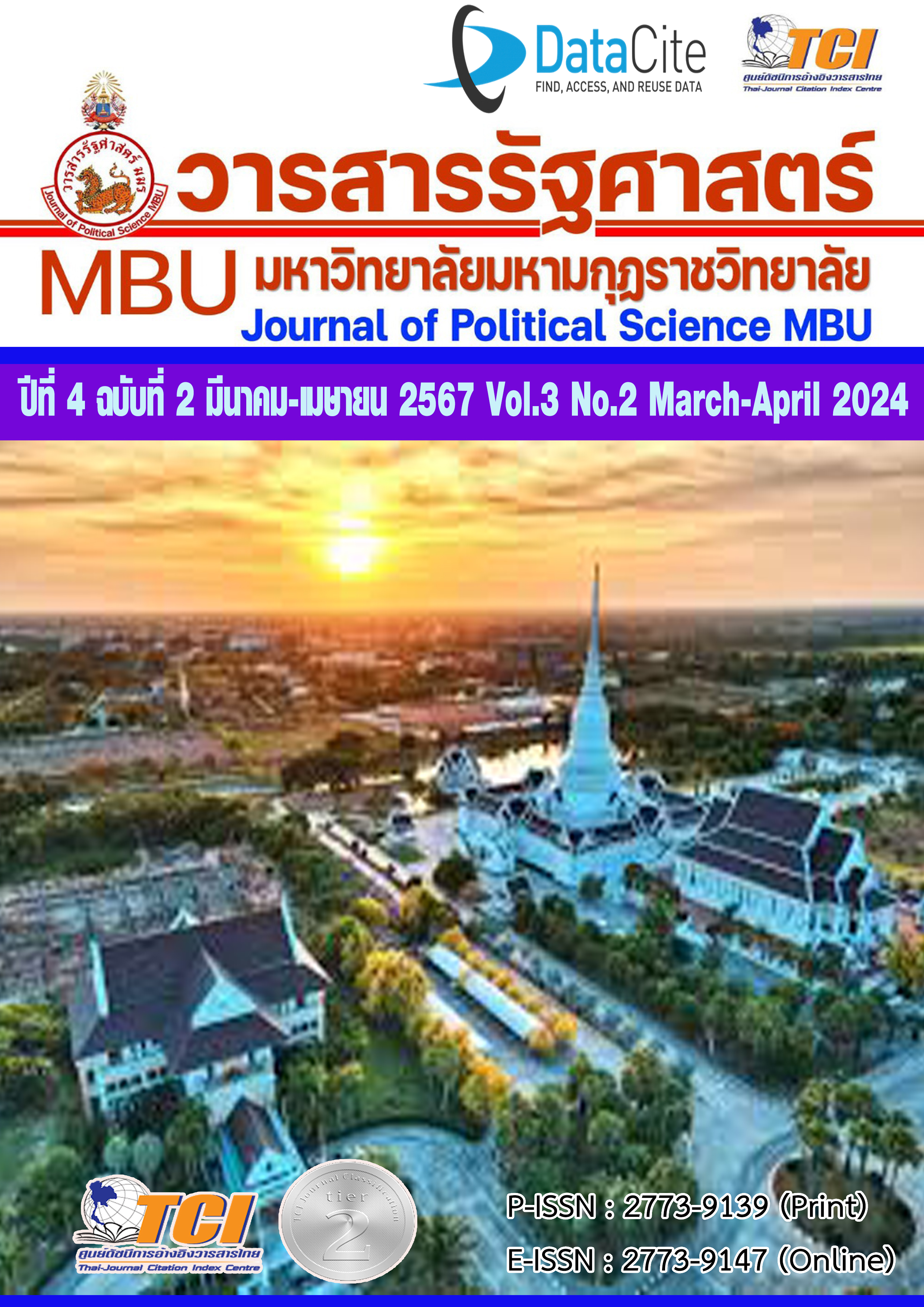AN APPLICATION THE PRINCIPLES OF TITTAHADHAMMIKATTHA TO DEVELOP INFORMATION AND COMMUNICATION TECHNOLOGY MANAGEMENT OF MAHAMAKUT BUDDHIST UNIVERSITY YASOTHON BUDDHIST COLLEGE
Main Article Content
Abstract
The objective of this research is to study, compare, and utilize the data of applying the principles of ethical benefits in the management of information technology and communication in the administration of undergraduate education at Mahamakut Buddhist University, Yasothon Buddhist College, and the Faculty of Science, for the academic year 2022. The research findings indicate that the application of ethical benefits for the development of management in the field of information technology and communication of these universities, in all three aspects, is at a high level (µ 3.99) as follows: foundational principles are highly utilized (µ 3.95), principles of beneficence are highly utilized (µ 4.06), principles of non-maleficence are highly utilized (µ 4.24), and principles of justice are highly utilized (µ 3.85). The comparative results of the application of ethical benefits in the management of information technology and communication in the Faculty of Science, Yasothon Buddhist College, categorized by gender and position, show that there is no significant difference among faculty members, educational personnel, and students at the .05 level of significance. Moreover, the application of ethical benefits in the organization can significantly benefit both the organization and stakeholders at a high level (µ 3.99).
Article Details

This work is licensed under a Creative Commons Attribution-NonCommercial-NoDerivatives 4.0 International License.
References
ชัยภักดิ์ นิลดี. (2554). การศึกษาสภาพ ปัญหา และแนวทางแก้ไขการบริหารจัดการเทคโนโลยีสารสนเทศและการสื่อสารของโรงเรียนในโครงการหนึ่งอำเภอหนึ่งโรงเรียนในฝันสังกัดสำนักงานเขตพื้นที่การศึกษาพระนครศรีอยุธยา เขต 1 และ เขต 2. ใน วิทยานิพนธ์ครุศาสตรมหาบัณฑิต, สาขาการบริหารการศึกษา. มหาวิทยาลัยราชภัฏพระนครศรีอยุธยา.
ธีรวัส บาเพ็ญบุญบารมี. (2550). การศึกษาเรื่องหลักกรรมและการเกิดใหม่ตามแนวพระอภิธรรมศึกษาจากพระไตรปิฎก อรรถกถา ฎีกาตลอดจนคัมภีร์ทางพระพุทธศาสนา. โครงการธรรมศึกษาวิจัย. หลักสูตรวิจัยคัมภีร์พระพุทธศาสนา. มูลนิธิเบญจนิกา.
บุญชม ศรีสะอาด. (2545). วิธีการสร้างสถิติสำหรับการวิจัย. กรุงเทพมหานคร: สุวีริยาสาส์น.
บุญธรรม กังเจริญ. (2549). ปัญหาอุปสรรคในการใช้เทคโนโลยีสารสนเทศและการสื่อสารของสถานศึกษา. เรียกใช้เมื่อ 10 พฤศจิกายน 2565, จาก: http://www.thaigoodview.com/library/teachershow/chonburi/boonthum
พระพรหมคุณาภรณ์ (ปอ. ปยุตฺโต). (2558). พจนานุกรมพุทธศาสตร์ ฉบับประมวลธรรม. กรุงเทพมหานคร: โรงพิมพ์มหาจุฬาลงกรณ์ราชวิทยาลัย.
พระบาทสมเด็จพระปรมินทรมหาภูมิพลอดุลยเดช. (2543). คำพ่อสอน: ประมวลพระบรมราโชวาทและพระราชดำรัสเกี่ยวกับเด็กและเยาวชน. กรุงเทพมหานคร: มูลนิธิโตโยต้าประเทศไทย และมูลนิธิสดศรีสฤษดิ์วงศ์.
พระธรรมโกศาจารย์ (ประยูร ธมฺมจิตฺโต). (2549). พุทธวิธีการบริหาร. กรุงเทพมหานคร: โรงพิมพ์มหาวิทยาลัยมหาจุฬาลงกรณ์ราชวิทยาลัย.
พระครูโพธิธรรมานุกูล (บรรเทา ชุดจีน). (2563). ศึกษาแนวทางการนำหลักทิฏฐธัมมิกัตถประโยชน์เพื่อแก้ปัญหาชีวิตของพุทธศาสนิกชนในสังคมไทยปัจจุบัน. ใน วิทยานิพนธ์พุทธศาสตรมหาบัณฑิต. มหาวิทยาลัยมหาจุฬาลงกรณ์ราชวิทยาลัย.
พระสมุห์แวงชัย ธมฺมกาโม. (2557). ทิฏฐธัมมิกัตถประโยชน์กับการทำงาน. เรียกใช้เมื่อ 19 พฤศจิกายน 2565, จาก: http://waengchai.blogspot.com/ 2014/08/blog-post_75.html.
พวงรัตน์ ทวีรัตน์. (2542). วิธีการทางพฤติกรรมศาสตร์และสังคมศาสตร์. กรุงเทพมหานคร: โรงพิมพ์จุฬาลงกรณ์มหาวิทยาลัย.
วัชระ ฉัตรวิริยะ. (ม.ป.ป.). การบริหารจัดการเทคโนโลยีสารสนเทศ.เรียกใช้เมื่อ 19 พฤศจิกายน 2565, จาก http://www.kmitl.com/public/article/read/content/
สำนักงานคณะกรรมการการศึกษาแห่งชาติ. (2546). พระราชบัญญัติการศึกษาแห่งชาติ พ.ศ. 2542 และที่แก้ไขเพิ่มเติม (ฉบับที่ 2) พ.ศ. 2545. กรุงเทพมหานคร: สำนักงาน.
สำนักงานคณะกรรมการวิจัยแห่งชาติ. (2547). ตำราชุดฝึกอบรมหลักสูตร “นักวิจัย”. กรุงเทพมหานคร: สำนักงานคณะกรรมการวิจัยแห่งชาติ.
Cronbach. (1970). Coefficient Alpha and the Internal Structure of Tests. Psychometrika, 16, 297.


